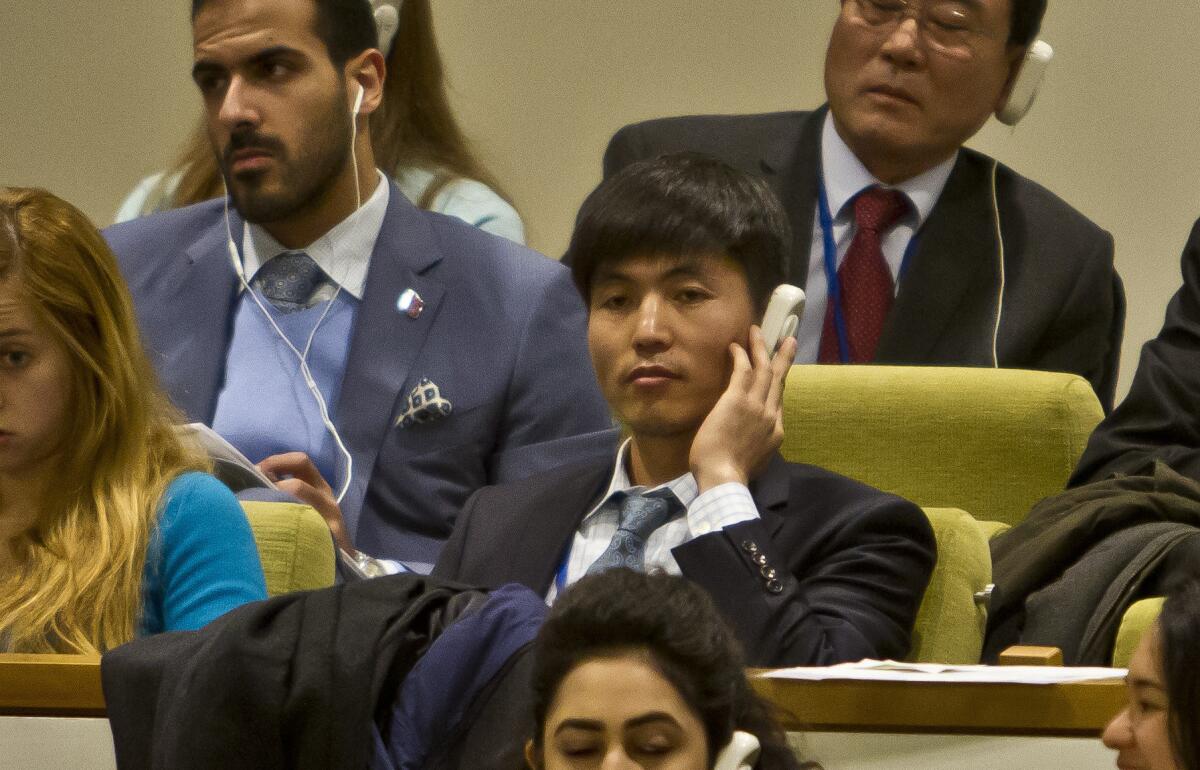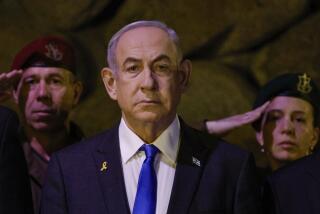U.N. panel votes for censure of North Korea’s human rights ‘horror’

- Share via
A move by more than 100 nations to send North Korea’s leadership to the International Criminal Court to face charges of crimes against humanity advanced Tuesday when the United Nations General Assembly human rights committee voted by a large margin to support it.
But the resolution calling on the U.N. Security Council to take the action that could expose North Korean leader Kim Jong Un to criminal charges and sanctions is likely to fail as China and Russia, both veto-wielding permanent members, have opposed the drive to hold Kim’s government accountable.
Still, the 111 nations voting in favor of the resolution brought by the European Union and Japan served to spotlight the atrocities allegedly committed by the Pyongyang government and spur its diplomats to clean up the hard-line communist country’s image. Nineteen countries, including Russia and China, voted against the move and 55 abstained.
Two American citizens sentenced to long prison terms in North Korea for unspecified crimes against the government were released last week in what was seen by analysts as a modest charm offensive by Pyongyang to deter support for the resolution. Matthew Todd Miller of Bakersfield and Kenneth Bae of Lynnwood, Wash., flew home Saturday in the company of National Intelligence Director James R. Clapper, who intervened to secure their release.
The EU-Japan resolution to pursue prosecution of North Korean leaders was spurred by a 400-page report by a U.N. commission of inquiry in February detailing the abuses committed against political prisoners, said to number as many as 120,000 and exposed to mistreatment that “exceeds all others in duration, intensity and horror.”
The report was compiled from interviews with North Korean defectors, some of whom addressed the rights committee in New York with blood-curdling tales of being burned, strung upside down and beaten, starved and told of tortures committed against their loved ones.
Among those testifying to the rights committee was Shin Dong-hyuk, a 31-year-old born in a political prison camp and the only North Korean known to have escaped captivity to flee abroad. In an interview with The Times last week, Shin showed scars on his ankles and stomach from beatings and interrogations during the 24 years he spent in captivity. His ordeal and his dramatic escape are revealed in “Escape from Camp 14: One Man’s Remarkable Odyssey From North Korea to Freedom in the West,” by Washington Post journalist Blaine Harden.
The committee of inquiry report accuses the North Korean government of mass murder, enslavement, torture, rape, forced abortions and sexual violence.
When the resolution was brought up for debate Tuesday, Cuba attempted to have it stripped of its most potent language but failed. Havana’s U.N. ambassador, Rodolfo Reyes Rodriguez, said Cuba, China, Russia, Iran, South Africa and more than a dozen other countries opposed the move to censure North Korea for the precedent it could set in unfairly targeting a single nation.
China has long been North Korea’s closest ally but has been less vocally supportive of the country ruled by the Kim dynasty since its founding after World War II, angered by the leadership’s three nuclear device tests in recent years in defiance of international law and U.N. resolutions.
Kim sent a special envoy to Russia this week in a high-profile effort to expand economic and political ties with Moscow, which last year wrote off $11 billion in Soviet-era debt owed by Pyongyang and has invested in rail and port projects in the country with which Russia shares a small and remote border.
China and Russia are both expected to wield their veto right to defeat the resolution when it is brought before the Security Council. The rights committee vote in favor of it nevertheless won praise from rights advocates.
“Finally, the U.N. has sent the message today that North Korean rulers who starve and enslave their own people must be held accountable,” said Hillel Neuer, executive director of the Geneva-based UN Watch. “This is a powerful boost to millions of victims suffering in what is arguably the worst situation of human rights abuse on the planet.”
Human Rights Watch senior counsel Param-Preet Singh also praised the gesture of the resolution as a “strong voice” of the international community that is pushing Pyongyang to amend its behavior.
Follow @cjwilliamslat for the latest international news 24/7
More to Read
Sign up for Essential California
The most important California stories and recommendations in your inbox every morning.
You may occasionally receive promotional content from the Los Angeles Times.













